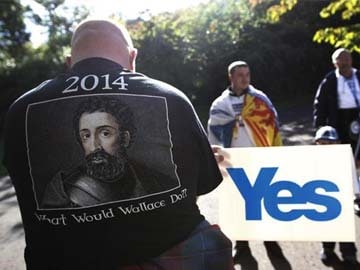
Pro-independence supporters take part in a rally in Princes Street gardens in Edinburgh, Scotland on September 22, 2012
London:
British Prime Minister David Cameron on Wednesday dismissed the Scottish government's vision of how the country would look if it votes for independence next year, accusing nationalists of ducking the biggest policy questions.
Speaking in the UK parliament in London, Cameron said the 670-page blueprint for independence lacked credibility and failed to give detailed answers about an independent Scotland's future currency or its role in the European Union and NATO.
The Scottish government document, published on Tuesday, aimed to set out how the country could prosper if voters choose to end the 306-year union with the rest of the United Kingdom in a referendum due in September 2014.
"We were told it would answer every question and yet no answer on the currency, no answer on the issue of EU membership, no proper answers on NATO," Cameron said. "We were just left (with) a huge set of questions."
Britain's three main UK-wide political parties oppose Scotland's independence, arguing that the country of 5 million people would be less prosperous and less secure on its own.
Scotland's First Minister Alex Salmond, leader of the Scottish National Party (SNP), which dominates the devolved Scottish parliament, says it could thrive if it took the historic step.
His plan for an independent Scotland envisages staying in the EU and NATO. It also anticipates sharing the pound with the rest of the United Kingdom. However, the government in London has said that would be unworkable.
"Should the people of Scotland vote to become independent, a currency union would be highly unlikely," Cameron's spokesman told reporters on Wednesday.
The opposition Labour Party described the independence blueprint as a "thick document full of false promises".
"In the absence of any detailed costings, it wasn't a blueprint for independence, but a wish list," Anas Sarwar, deputy leader of the Scottish Labour Party, told parliament.
The SNP accused its opponents of scaremongering and criticised Cameron for refusing to take part in an independence debate with Salmond.
But Cameron, whose right-leaning party is deeply unpopular in Scotland and holds only one of its 59 UK parliamentary seats, said Salmond should hold the debate with the leaders of the campaign to maintain the union inside Scotland. He said calls for him to be involved were a distraction.
"When it comes to the economy, when it comes to jobs, when it comes to Europe, all the arguments are for staying together," Cameron told parliament.
A weekend poll for the Sunday Times newspaper showed 47 per cent of Scots wanted to keep the union, 38 per cent wanted independence and 15 per cent were undecided.
Speaking in the UK parliament in London, Cameron said the 670-page blueprint for independence lacked credibility and failed to give detailed answers about an independent Scotland's future currency or its role in the European Union and NATO.
The Scottish government document, published on Tuesday, aimed to set out how the country could prosper if voters choose to end the 306-year union with the rest of the United Kingdom in a referendum due in September 2014.
"We were told it would answer every question and yet no answer on the currency, no answer on the issue of EU membership, no proper answers on NATO," Cameron said. "We were just left (with) a huge set of questions."
Britain's three main UK-wide political parties oppose Scotland's independence, arguing that the country of 5 million people would be less prosperous and less secure on its own.
Scotland's First Minister Alex Salmond, leader of the Scottish National Party (SNP), which dominates the devolved Scottish parliament, says it could thrive if it took the historic step.
His plan for an independent Scotland envisages staying in the EU and NATO. It also anticipates sharing the pound with the rest of the United Kingdom. However, the government in London has said that would be unworkable.
"Should the people of Scotland vote to become independent, a currency union would be highly unlikely," Cameron's spokesman told reporters on Wednesday.
The opposition Labour Party described the independence blueprint as a "thick document full of false promises".
"In the absence of any detailed costings, it wasn't a blueprint for independence, but a wish list," Anas Sarwar, deputy leader of the Scottish Labour Party, told parliament.
The SNP accused its opponents of scaremongering and criticised Cameron for refusing to take part in an independence debate with Salmond.
But Cameron, whose right-leaning party is deeply unpopular in Scotland and holds only one of its 59 UK parliamentary seats, said Salmond should hold the debate with the leaders of the campaign to maintain the union inside Scotland. He said calls for him to be involved were a distraction.
"When it comes to the economy, when it comes to jobs, when it comes to Europe, all the arguments are for staying together," Cameron told parliament.
A weekend poll for the Sunday Times newspaper showed 47 per cent of Scots wanted to keep the union, 38 per cent wanted independence and 15 per cent were undecided.
© Thomson Reuters 2013
Track Latest News Live on NDTV.com and get news updates from India and around the world

